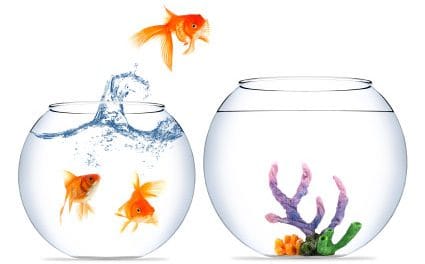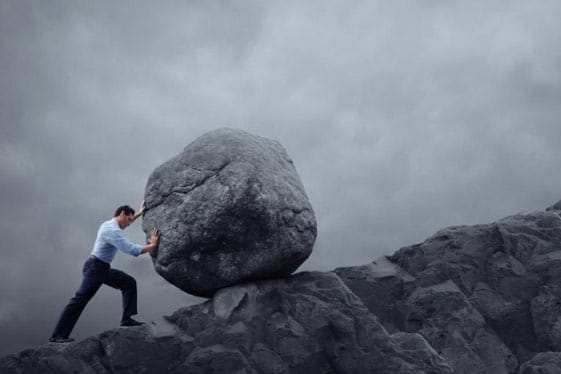
Today, no one doubts that thoughts can play a key role in health. Even official medicine agrees. Most illnesses – some estimates as high as between ninety and ninety-five percent – are thought to have a psychosomatic origin. But it ‘s not just thoughts, it’s the whole collage of experiencing reality: memories, outlooks on the future (and assessing how well we’re going to navigate key areas), views of ourselves, relationships …
This includes our experience of the current situation, i.e. our view of how we manage key areas of our lives.
Although we have heard many times that we need to let go of thinking about the past and the future and live in the here and now, the path is not so easy … nor is it so straightforward.
Before we look at a convenient solution, let’s explain the power of the present moment.
The present is the only time we have
Not only are thoughts, feelings and actions deeply intertwined and create our well-being (or, as we also say, our dominant energy state or personal vibration), but actions are also powerful tools for breaking patterns and habits. For example, when we are in a bad mood, taking part in sport can quickly lighten the mood.
The present is the only time we have, because everything that happens is happening in this moment. Any change happens in real time – i.e. at the moment it is introduced, not somewhere in the future – and any significant change will happen outside our comfort zone. When we make changes within our comfort zone, i.e. within existing activities that make us feel comfortable, safe and at home, these are merely “cosmetic fixes”, not major substantive advances.
The key to realisation is always to make a decision that leaves no room for doubt that we would direct our energies elsewhere. Through concentration of energy and total commitment to a particular action, we take control of the situation and also responsibility.
This is an ideal scenario which, to be honest, only happens here and there. Change is hard, because most of us are not used to it and are not ready to summon the strength and courage to take the plunge into the unknown. As a result, we find ourselves at a crossroads: we know deep down that change is necessary – or at least desirable – but we do not have the knowledge, the will or the tools to make it happen.
For example, we go to a job where we don’t feel well. Our colleagues (read: boss and management) don’t like us very much. We feel that we are not valued enough and the pay is not very good.
That is why we experience pain. Day after day, we fantasise about doing something else that would make us feel better; maybe even for (slightly) less money.
Since our current situation does not allow us to remain without income, and we do not have the strength and courage to quit our jobs and look for a new one, we persevere. Of course, this action also takes its toll: Every day, when we resurrect the thoughts and feelings that outline our view of the situation, we build and consolidate the energy of the so-called low vibration: numbness, sadness, helplessness, anger, despair, etc.
The problem lies not in our actions, but in our perception of the situation

And that is the biggest problem. What we do physically doesn’t even matter that much, as long as we can at least accept the situation through neutral emotions. Our view or interpretation of what is happening to us is literally changing the chemistry of the cells in our body and consequently our state of health.
The more we see the situation we find ourselves in as unfriendly, unwelcoming, distressing, etc., the more internal stress we will create. Cells will go into shock and shut down, defence mechanisms will start to fail, thoughts will become more and more vague, we will have less and less energy, and so on.
But maybe we’re not so bad at work …
Sometimes we simply get stuck in a problem and inflate it so much that it becomes a priority in our minds. We no longer see beautiful and favourable things and circumstances – they become taken for granted – but we focus our thoughts on the problem(s).
Most of the time, this kind of experience of a situation is not conscious, but arises from well-established unconscious programmes. That is why we do not even perceive what is happening. (When Dr Alex Loyd, author of “The Healing Codes”, measured the state of people who considered themselves to be in balance, he found that about 90% were stressed.)
But even if we were aware of what we were doing, we could not change what we were doing overnight.
However, change is needed.
Extraordinary power of vision

How can we work to avoid this kind of stress? One of the quickest and simplest solutions is to change our focus: we can win over the doubting mind, which is difficult to tame. Let’s look at the matter a little more broadly.
The key activities that have the greatest impact on our thinking and, consequently, our health are: our relationships (with ourselves and with others), our personal finances (in terms of providing the necessary resources), and our business status or the activities that bring us money: our job, our personal business, etc.
In all these areas, we reflect on past experiences, observe the current situation and assess what it all means for our future. If we analyse our own feelings in great detail, we will find the following: it is not the current situation that makes us feel bad, but the thought of an unpleasant future.
The mind becomes locked into the current state, “freezes” it and projects it into the future. In other words, what we are experiencing now, the mind imagines will continue indefinitely. And that is where the greatest pain comes from.
At the same time, there is another unconscious feeling, buried a little deeper: when we have no vision and no faith in a better future, we see the current situation as all that is left. We are left without options, forgotten somewhere on the sidelines… but life goes on. (The description of this state of affairs often used by professionals is one of quiet hopelessness.)
How can we check this? Let’s imagine a situation in which we are uncomfortable, but at the same time have the assurance of a better future.
Let’s stick with the example of a job we don’t feel good in. Unless we have an idea, a plan or at least a desire or vision to change it, adapt it or at least change the way we look at it, the very thought of a job makes us feel uncomfortable.
But it’s very different when we are facing a change for the better. Let’s put it this way: A friend who knows and appreciates our work invites us to join his fast-growing company as a partner. Not only will we feel more relaxed at work, doing the tasks we are best suited to and really good at, but our pay will also be significantly higher.
We have already agreed on everything, we just have to wait a month or two to sort out the legal issues.
Wouldn’t our feelings about our current job be different? But nothing has actually happened (yet), only our perception or view of the future has changed.
When we have a vision, a belief, or even a guarantee that things will improve in the future, the current situation no longer bothers us so much.
Vision takes importance away from the present moment

Vision allows us to give less importance to the status quo (read: we are not dependent on it, or trapped in it, and then we don’t know how to move forward), so the shortcomings of the current situation do not come to mind as much.
Without a clear, powerful and inspiring vision, the experience of the current reality is completely different, because the status quo is all we have… and in it we must find fulfilment or satisfaction.
This means that we will only feel good when – to stay with the work example – we are praised at work, when our colleagues are relaxed and friendly, when we get a reward or a gift, and so on.
In short, if we don’t draw inspiration, motivation, energy, etc. from the vision, we will look for these things in the existing circumstances – which will have to happen exactly as we want and expect them to happen. If they don’t, we will feel bad.
Combining vision and current action, or how to make sure your vision is realised

But how can we help ourselves to feel better when we have no guarantee of a better future?
One of the most effective ways of experiencing the present moment differently is to bring the attributes we feel in the vision into our current reality.
Let’s stay with our example concerning the workplace. So we have no guarantee of a better job, but we would like a change because we do not feel comfortable in our current circumstances.
The key to the solution lies not in changing circumstances, but in changing ourselves. First, we change the perception of the current situation. First, we need to believe that there is a better future for business. If not in this job, then somewhere else. So we need to have a vision and at least a little faith and trust that change for the better is possible.
Second, we need to “help” or “go towards” the vision to make it happen. Let’s ask ourselves: “How would I have to perform in my current job to make my business progression inevitable or the only realistic option available?”
Or what would I have to do differently to get my employer to move me to a better job, give me a pay rise, or let me set my own conditions? And if my current employer did not do this, would someone else be happy to employ me – on my terms?
This step is usually the most difficult. We have somehow acquired the attitude “You will get as much (little) from me as you pay me”. This is not the right approach … and it is also the biggest productivity problem in companies (and in the whole country, by the way).
The only way to move to a better job is to be proactive, where we do our job so well that the employer cannot afford to lose us – because we will add too much value to them or to the company. And this shift in mind, and then in practice, must be made no matter how poorly we are currently paid or how impossible the conditions in which we work.
Maybe the company you work for really isn’t the best or doesn’t value your work. And you know you deserve more… just so what if no one sees it. This is, unfortunately, a very common situation. But your current job is the only environment you have to prove how good you are (can be).
So the easiest way to get ahead is to be even more productive, enthusiastic, responsible …. until you are so (positively) out of the average that someone notices.
Take your current job as a challenge to become indispensable. And have a vision, or trust that if your employer doesn’t appreciate it, someone else will. A competitor, for example.
When we do three times better than we are paid …

Something remarkable happens in the mind when we do this: because we change the way we look at the workplace – it is no longer a daily pressure, but an opportunity to prove how we can do so much more than we have done before – a completely different emotion is activated.
All you have to do is trust in a happy ending and take a slightly more active and enthusiastic approach to getting the job done; give it your all, no matter how others react to your new enthusiasm. (Warning: your colleagues won’t be very happy about this…)
When you think about your colleagues and realise that you stand out from the average, or that you don’t know anyone who does your job with more drive, precision, commitment, discipline …, it’s only a matter of time before you’re offered better working conditions.
Is it worth it? Oh, yes… Not only will you look at your job differently, but you will be less(!) tired – even though you may be working hard (or so it will seem when you compare your new job with your previous one) – you will feel much better, and you will have more confidence in your vision or in a happy ending every day.
In addition, your self-esteem will improve dramatically, your confidence will grow, and you will have more energy, courage and willpower.
What do you gain by staying with what you have? Nothing in time, because you will spend the same amount of time at work. You won’t be less tired either; quite the opposite.
Although you will be less active at work, the internal pressures, stress and feelings of distress will be so intense that you will return home more tired, bored and listless. Not because of work, but because of non-work: when we express ourselves creatively, we are literally generating energy. If we hold back and watch the minutes and hours pass by in a tormented and numb way, it eats us up from the inside.
At the same time, as we have already said, we must maintain faith in a happy ending and a clear vision.
Communication and marketing short school
In the spirit of this paper, next time we will look at the key principles of good communication and marketing. So, if this article described what needs to be done differently, the next one will answer the question of how to go about it.
We will write about sales, the basics of successful communication, conducting interviews… The tips will be especially useful for those of you who have direct contact with customers, or who present your ideas to your interlocutors in the course of your work.
The article is based on the books written by Boris Vene and Nikola Grubiša.
